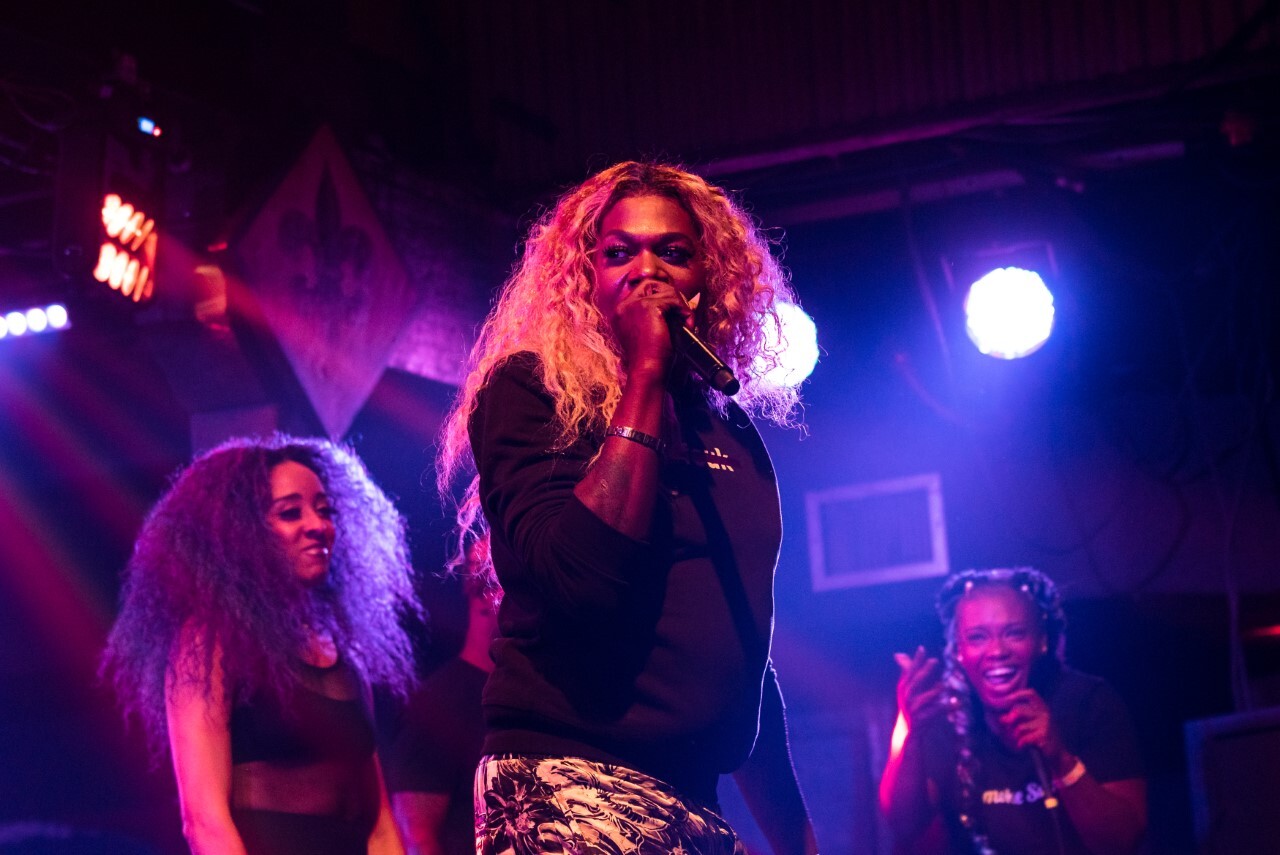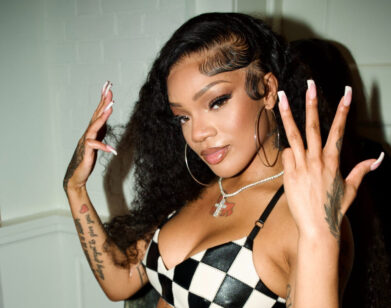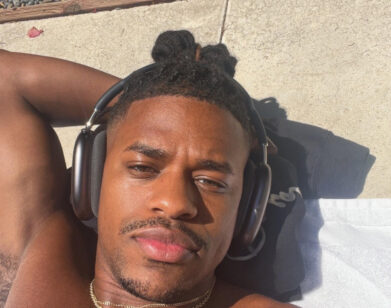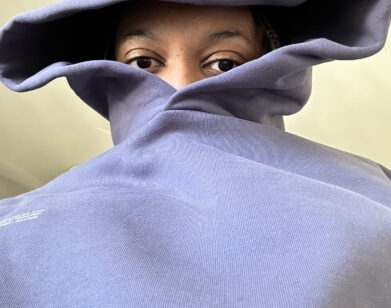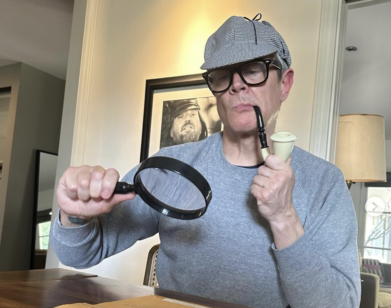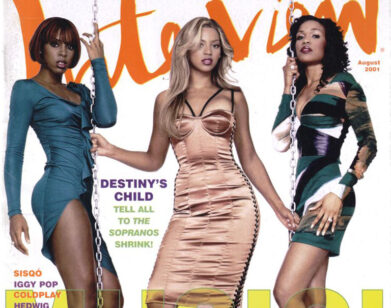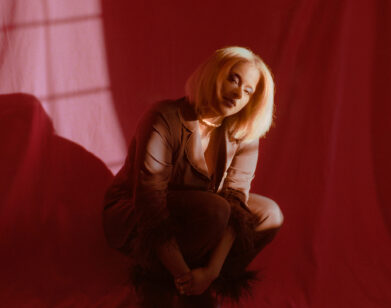Big Freedia Brings People Together Through the Power of Ass
The New Orleans bounce rapper Big Freedia has a gripping voice that belongs in a museum. Whether she’s adding a booming bit of spice to Beyoncé’s “Formation” or dueting with Lizzo on “Karaoke,” Big Freedia is prominent and powerful, and rose the ranks of the rowdy bounce scene performing her signature hypnotic, repetitious style of rap. That sound can be heard on her latest EP, Louder, which was released just before much of the country ground to a halt. The sudden stasis left Freedia in a weird limbo, unable to perform songs that were designed specifically to make crowds turn up. But when we caught up with her on Juneteenth, Big Freedia’s unshakeable spirit showed no signs of damage.
———
JAKE UITTI: Do you remember the first time you made something that you loved?
BIG FREEDIA: The first time I made something that I loved? Yeah, a cake.
UITTI: What kind of cake was it?
FREEDIA: It was a yellow cake with chocolate icing.
UITTI: Was it for a birthday or for your own enjoyment?
FREEDIA: Just for enjoyment. We were cooking at home on a Sunday, and my mom let me make the cake.
UITTI: Do you remember how old you were?
FREEDIA: I was probably about 10.
UITTI: Do you have a favorite childhood memory?
FREEDIA: Always cooking in the kitchen with my mom, sitting there, being her little guinea pig. Licking the bowl. Helping with all kinds of stuff in the kitchen. And, you know, going to church and singing in the choir. Lots of good childhood memories.
UITTI: Do you have a favorite kitchen from your childhood?
FREEDIA: Probably the one in the house that we lived in when I was going to high school, on Music Street.
UITTI: Wow, you lived on Music Street?
FREEDIA: Yes, I did!
UITTI: Did that have any effect on you?
FREEDIA: Well, I was already into music by the time I got to Music Street. I was heavily into the choir. I was a choir director for my high school and for my church. It started when I was young, a bit younger than that, and it developed all the way until now.
UITTI: Do you remember when you became aware of New Orleans and how truly special it was?
FREEDIA: In my early 20s. When you’re young, you’re just going with the flow. Then I started realizing how special this place was and how many people come to tour and how unique we are. But I really discovered it when I got to go outside and start exploring the world. That’s when I had another look at it and really got that full view of, “Damn, New Orleans, there’s no other place like it in the world.”
UITTI: You were displaced in 2005 because of Hurricane Katrina and spent time in Texas. How did your idea of home shift or evolve during that time?
FREEDIA: I guess I was very disturbed and shaken up just by being out of New Orleans. That’s all we were used to was growing up in New Orleans, so everything was new beginnings. It gave us a chance to live somewhere different, breathe some different air, do some different things, see some different people. When they opened New Orleans East back up, we had one of the first apartments back open, so I was able to get back in really soon. I was dying to get back to New Orleans. It’s all I knew.
UITTI: When did you discover bounce music and how did it change your life?
FREEDIA: When I was in middle school. They used to have dances and it just changed my life, the sound and the dance moves that they were doing and the lyrics that they were saying. One of my best friends put me on to just a lot of the different rappers. I would put him on gospel and he would put me on bounce and hip-hop. We lived in some of the neighborhoods that the local rappers came to. So we were able to hear it outside the bar room at our houses because we lived so close. The bar room was right on the corner and we could hear it through the whole block.
UITTI: Bounce music is so hypnotic. Is that a quality that you especially appreciate, the repetition and the hypnosis it offers?
FREEDIA: I think so. It’s more like a feeling of a spirit. Because we all have different ways that we make you feel when we perform as bounce artists. It just depends on the feel. It definitely can get people into a party atmosphere and turn the party all the way up.
UITTI: Can you describe what performing in those early New Orleans clubs was like?
FREEDIA: I played seven days a week for a lot of years in my career. I had different clubs that people came to see me in and I helped build those clubs from the ground up with no one in there but me and the owner and the staff. Then we filled the rooms to capacity. For me, that was a great journey of just really consistent work and hard work. The connection with the audience was amazing, just the feeling of it was something new and fresh for them, so they were excited, they were telling their friends and their friends was telling their friends and so on. That was the start. You got a lot of great original stuff then. The rawness and the realness of it, there was no better feeling.
UITTI: Your vocal style is so remarkable. How did you go about owning that big, powerful style?
FREEDIA: Church. The choir prepared me for all of that. You can hear all of that in the loudness, the different levels of singing. The vibrato in my voice when I hit the note, all of that comes from the choir.
UITTI: What do you like about highlighting the booty?
FREEDIA: The most important thing is that I bring people together through the power of ass. That’s my line. We come together and we all make ‘em clap.
UITTI: You’ve collaborated with Beyoncé, Drake, RuPaul, Lizzo, and Kesha. Do you have a favorite moment working with one of these artists?
FREEDIA: For me, all of those were highlights. In every situation, from RuPaul to Beyoncé to Drake to Kesha to Lizzo, every situation was a highlight of my career and I’m just grateful for all of those people who I’ve been able to collaborate with and make music with and who just accept me for who I am and as an artist. I’m very grateful for the opportunity to continue to spread the culture of New Orleans and Bounce music.
UITTI: Did Beyoncé give you a particular compliment that sticks with you today?
FREEDIA: All of it. Just the phone calls from Beyoncé when I was at home and she called me personally on my cell phone. Then we got to hang out a few times at clubs in New Orleans. She came to see me perform, plus Kelly Rowland and Solange, a long time ago. And then I got to hang out with her for her mom’s 60th birthday party. We’ve interacted many times and we’ve hung out. Everything she says sticks with me.
UITTI: You had a new EP, which included a single with Kesha, that came right out as the country was quarantined. What was that like?
FREEDIA: It has been a little tough because, like you said, my album dropped right when the coronavirus hit. I just had so much stuff that I wanted to do and so many spaces that I wanted to perform the album. In order to push your project, you need to be physically on the ground. We’ve tried many things to keep promoting it online, but there’s nothing like people hearing it and seeing it and feeling it in person. So, it was a bummer for me. It still kind of is.
UITTI: Today is Juneteenth and there has been a lot happening in the world recently. How does your heart feel today?
FREEDIA: Today, I feel celebratory but I also feel sad for the struggle that the people have to go through. I’m up and down in feelings. It’s crazy because you feel the pain that the ancestors had to go through, and then you also celebrate the change. Staying around positive vibes is the most important thing , and keeping a cool head and a cool mindset with everything that’s happening around the world.
UITTI: What can the world learn from New Orleans?
FREEDIA: We’re a city that strives. We don’t give up easily. We have been through a lot but we are a loving community and we are all about people. We’re open and we’re welcoming. We are a free spirit city. Our strength is amazing.

